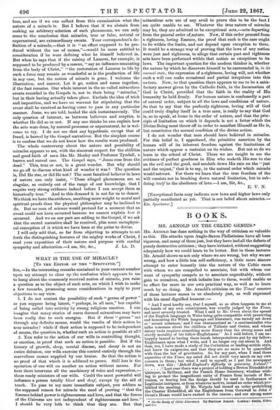WHAT IS THE USE OF MIRACLE ?
[To THE EDITOR OF THE " SPECTATOR."]
the interesting remarks contained in your current number upon my attempt to clear up the confusion which appears to me to hang about the commonly received notion of miracle, you raise a question as to the object of such acts, on which I wish to make a few remarks, presuming some considerations in reply to your objections to my view.
1. I do not contest the possibility of such " germs of power " as you suppose being latent, " perhaps, in all men," but capable of being called into activity by strong religious emotion. I can imagine that many stories of cures deemed miraculous may have been really due to such energies. But if these " germs " act through any definite means, would the results of their action be true miracles? while if their action is supposed to be independent of means, the question is, whether such an action is possible at all ?
2. You refer to the action of our wills in controlling thought, or emotion, in proof that such an action is possible. But if the history of growth, sleep, mental disease, and decay is not an entire delusion, our wills exercise this control entirely through the marvellous means supplied by our brains. So that the action is no proof of that which it is adduced to prove. Still less is the operation of one will on another an action without means. For here there intervene all the machinery of voice and expression,— those ready ministers of our wills. Could the most powerful will influence a person totally blind and deaf, except by the aid of touch. To pass to my more immediate subject, you adduce as the supposed reason for miracle the need of proving " that the Essence behind power is righteousness and love, and that the forces of the Universe are not independent of righteousness and love." I should be very loth to think that they are. But that miraculous acts are of any avail to prove this to be the fact I am quite unable to see. Whatever the true nature of miracles may be, they are admitted to be exceptional acts,—acts departing from the general order of nature. Now, if this order proceed from a righteous, loving Essence, the proof that such is the case ought to lie within the limits, and not depend upon exception to them. It would be a strange way of proving that the laws of any nation were just and righteous, to allege that certain past and righteous acts have been performed within that nation as exceptions to its laws. The important question for the modern thinker is, whether the nature by which he discovers himself to be surrounded is, in its normal state, the expression of a righteous, loving will, not whether such a will can make occasional and partial irruptions into this nature. Now, to that question there appears to me to be a satis- factory answer given by the Catholic faith, in the Incarnation of God in Christ, provided that the faith in the reality of His humanity be held firmly. For human nature is confessedly a part of natural order, subject to all the laws and conditions of nature. So that to say that the perfectly righteous, loving will of God could truly display itself in a true man, is really to say that God is, so to speak, at home in the order of nature, and that the prin- ciple of limitation on which it depends is not a fetter which the Divine Being must throw off in order to manifest Himself as He is, but constitutes the normal condition of the divine action.
I do not wonder that men should have believed in miracles. For this belief is, I apprehend, the primitive assertion by the human will of its inherent freedom against the limitations of nature which appear a restraint on its wishes. But not so do we learn in the school of Christ. There we are taught to see the evidence of perfect goodness in Him who maketh His sun to rise on the evil and the good, and sendeth down His rain on the " just and the unjust," that is to say, in the natural order which miracle would subvert. For there we learn that the true freedom of the will consists not in breaking down natural limitation, but in sub- duing itself to the obedience of love.-1 am, Sir, &c.,
E. V. N.
[Exceptional facts may indicate new laws and higher laws only partially manifested as yet. That is our belief about miracles.— En. Spectator.]






























 Previous page
Previous page